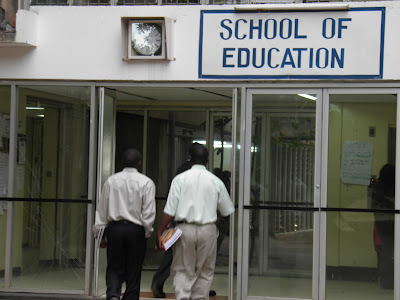Saturday, February 19, 2011
Teaching...
So you think to yourself, "Mary went to Zambia to teach, didn't she? How come she doesn't write about that?" After several months of getting ready for the new term, I am finally teaching.
Arriving in October meant that I came just as the first semester exams began. Exams run for three weeks followed by three weeks of marking, moderating grades and presenting results to outside examiners. I participated best I could in all the department and School of Education meetings but with very limited,well, actually no responsibilities. I spent time working on school library curriculum, the Lubuto Library Project and writing a chapter for a book on school librarians and school libraries that will be published in the spring by two international library associations, IFLA and IASL.
The second semester which was to start 27 December was pushed back to 17 January. The first week was all about registration. Only then did the lecturers sort out who was teaching what portions of what courses ( each course is shared by at least three lecturers, each taking different units), and who would facilitate tutorials. Each class meets three times a week for one hour lectures and in small groups for an additional hour of tutorial. Classes average from 88 - 120 students in the lectures and 20-25 in the tutorials. I am responsible for electronic resources and services units in the basic reference class and one tutorial; a tutorial with the first year students in library and society course; and the seminar in legal issues in libraries and information services for the graduate students. Its a challenge to remember where to be at what time on any given day, i.e. the reference course lectures are Tuesdays at 13:00 hours in the Math Lab, Wednesdays at 17:00 hours in the Lecture Hall I and Fridays at 13:00 hours in the Lecture Hall I. My tutorial for this course is Tuesdays at 8:00 hours in the Cataloging Lab.
The students are many, very verbal and quite welcoming. I am slowly learning names and faces. Many have found my office on the fifth floor of the Education building and have come to visit, inquiry about studying in the U.S., asking followup questions from lectures and tutorials. We are getting along. Likewise, the other lecturers are very very warm in their welcome and try by all means to include me in the department meetings, activities and concerns. I went to the wedding of one lecturer, attended the funeral of another lecturer's twin brother and welcomed a new baby of yet another of the lecturers. In many ways, life here is much the same as in the U.S. with the same range of human emotions and reactions to those feelings.
Using a variety of active learning strategies challenges the students. The education model is a hold-over from colonial times. Lecturers lecture and students copy in notebooks what the lecturers are reading from notes. Partly the model and also partly the lack of textbooks and library materials. The tutorials are much more active focusing on student presentations, small group discussions, revision of lecture notes. Classes being 1 hour in length makes the note-taking manageable.
The collection in the UNZA Library appears to have had little added to it since 2000. The library itself is in need of renovation and major repairs. The roof leaks and in this rainy season the upper level of books are wet and mildewed and not for the first time. The library auditorium where many classes meet including one of mine has deteriorated ceiling tiles, puddles on the floor when it rains and a very musty, moldy smell. There have been numerous calls to fix the library and many plans including work to be done this year. But like many institutions of higher education, resources are limited and the needs for physical maintenance across the campus many.
This week's assignment in the reference sources and services class is to consult encyclopedias, dictionaries, almanacs and yearbooks, answering questions and recording the process. A very familiar assignment for library studies but perhaps in a more challenging environment. My biggest concern is the lack of access to electronic resources and even to the standard texts for reference courses that discuss electronic sources. I am very intrigued with a project from the University of Iowa library school called e-Granary. Described as an "internet in a box" the software provides access to webpages, full-text articles and includes the possibility of lecturers creating syllabi with links to resources in the database all without needing an Internet connection. That would be so helpful for students here and a good way to introduce them to using electronic sources.
So, I am teaching and enjoying the challenges it presents. The students and I are mostly together - ti pamodzi - as they say. Oh, and I did hear yesterday, a very very colloquial way of saying "raise your hand" - in some churches the call to raise arms in praise is "stand up your hands"!
-Mary
Subscribe to:
Post Comments (Atom)

Sounds wonderful!
ReplyDelete